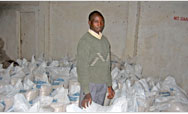For Malawian farmers, fertilizer can make the difference between a hungry year and a healthy one. Malawi has one of the highest population densities in Africa, with 85% of the population farming on small plots. Soil degradation is widespread, and homegrown manure from livestock or composting isn’t commonly practiced. Most farmers rely on chemical fertilizer for a good harvest. Until the mid-1990’s, fertilizer sales -- mostly imported -- were controlled and subsidized by the government. When the system was privatized, a few central companies took over. But poor distribution and high prices meant that fertilizer was inaccessible for many smallholder farmers.
Beginning in 2002, USAID began to revitalize fertilizer distribution in Malawi with support to the International Center for Fertility and Agricultural Development. USAID began by developing a network of middle- and small- sized business dealers in fertilizer. The middle-level dealers purchase fertilizer from the supplier, then distribute it to local dealers. This creates a system of credit for the local dealers, who are usually village shop owners with little cash and no access to credit.
In less than two years, there are over 1,000 new fertilizer dealers with 30% of them women. At village shops, local dealers receive training in business skills, which is essential since the adult literacy rate in Malawi is 60%. The dealers are organized into district associations, now in twenty-seven of Malawi’s twenty-nine districts. These associations provide accountability and the leverage to buy fertilizer in bulk. As the associations grow in number and gain experience, USAID expects fertilizer to be cheaper and more accessible to millions of Malawians in the next few years.
|


